Chapter 4: Performing ECG
1/82
There's no tags or description
Looks like no tags are added yet.
Name | Mastery | Learn | Test | Matching | Spaced | Call with Kai |
|---|
No analytics yet
Send a link to your students to track their progress
83 Terms
The ECG experience should be ________ for the patient not produce ________.
pleasant; anxiety
What is the first thing you need to do prior to performing an ECG?
Prepare the room.
What factors should you consider when preparing or choosing a room?
Choose a room away from other electrical equipment and xray machines to reduce interference.
Turn off nonessential electrical equipment that is in the room during the tracing.
ECG machine should be placed away from ______ ______ ____…
other sources of electrical currents such as wires or power cords.
An ECG must be ordered by a ______ or other licensed personnel.
physician
As a sonographer, _______ the order is important.
verifying
The printed form or electronic order is called a
requisition or consult
T/F: the order should include why the ECG was ordered.
True
Included in the requisition/consult/order should be (5)
ID: Name, Medical Number, DOB
Profile: Patient age, sex, race, cardiac and other medications pt is taking
Weight and Height
Any special condition
Ask if they ever received an ECG and explain the procedure
ECG orders can be done electronically or on an ______ ____ ____.
handwritten order form
Where do you enter the patient information?
On the LCD panel
How is billing entered?
must be entered on computer or handwritten
How should you record the patient information if there is no time due to any emergency situation?
Write it on the completed ECG legibly
Before taking the ECG to a patient room, what should you do?
Check to make sure the machine has a good supply of paper loaded in it.
If you’re unsure of how to insert the new ream, what should you do?
Read the manufacturer’s instructions
What are the steps to refilling the paper in an ECG machine?
Open the tray of the machine
Place the paper inside machine
3.Thread it through roller
Close the paper-loading compartment and run the machine for proper functioning
Why should you determine if the patient is on medications prior to the ECG?
Certain cardiac medications can change the ECG tracing
The JTC has identified that patients must be identified by
two forms of identification. (Name and DOB)
First, identify the patient by 2 identifies. Second, obtain
patient consent by explaining what you are about to do
ECG is part of the patients ________ ________ so ensure the patient information is thorough and accurate.
medical record
What do you do if a patient refuses the ECG?
Determine the cause of the refusal.
Provide any additional information.
If patient still refuses, notify supervisor or licensed practitioner and document patients refusal.
How can you provide patients with privacy?
Remember to pull the curtain around the bed or close examination room door.
You could provide patient with a drape sheet or blanket.
To prevent interference, what should you have the patient do?
Remove any jewelry items that would interfere with electrode placement or touch the electrodes
Make sure that the bed or exam table is not touching the wall or any electrical equipment or power cords.
Make sure the patient is not touching metal.
Even if a patient is not able to respond, make sure you always…
Explain the procedure
T/F: The patient should be positioned most conveniently for the tech.
F: the patient should be as comfortable as possible on the supine position and should remain relaxed and still throughout the procedure.
Why is the position of the patient important during an ECG?
To help prevent workplace injury for you, try to work from the patients left side. It will prevent overreaching.
Body Mechanics
using movements that maintain proper posture and avoid muscle and bone injuries
You may have to ______ a patient.
Lift
What are some proper body mechanics?
Maintain wide base of support
Avoid twisting
Protect your back
Use stronger muscles for lifting
Maintain body alignment
When should you practice body mechanics?
All the time to prevent yourself from awkward injuries when moving or lifting patients or other large awkward items.
Maintaining Safety During an ECG
Raise bed to proper height
Keep side rail up on the opposite site of bed or exam
Perform hand hygiene
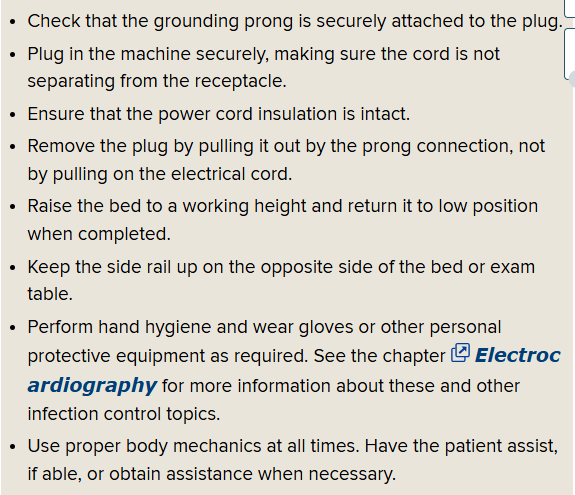
What are the post-steps after ECG?
Help patient to dress as needed to provide comfort
Clean the lead wires, leads, machine
If patient had a contagious disease, observe isolation precautions
Observe guidelines of workplace
Wash hands
Thank patient
Which leads should you attach first on the patient
the limb leads
Why are the first six views of the 12 lead ECG important?
a frontal plane of a cardiac crisis are better than nothing
Before operating the machine, make sure you have done these steps (7)
Identified and communicated w/ pt.
Prepared pt and room
Provide for pt privacy
Provide for safety and infection control
Located and checked equipment for functioning
Loaded ECG graph paper if necessary
Attached electrode and lead
To start an automatic machine, press the ______ or ____ button.
Run; auto
After pressing the run button, what should you do?
Check the screen for errors.
The process with an automatic machine should only take about
15-20 seconds
For a manual machine, make sure the equipment is set to
Lead II
What additional steps must you take with a manual machine?
Set the standardization mark between T wave of one complex and P wave of next. To know how to do that follow manual.
Artifacts
Unwanted marks on the ECG not caused by the heart. They are caused by some other source of movement or electrical activity.
You are responsible for what?
To produce a correct tracing without artifact
Troubleshooting Techniques During an ECG
Perform good skin preparation
Use new and used electrodes and clean clips
Ensure there is no stress on the lead wires
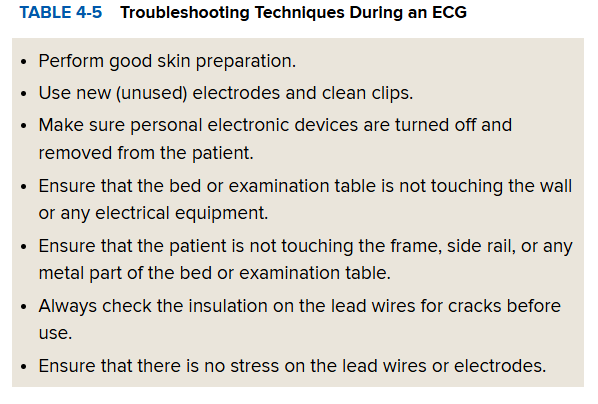
What are the three most common causes of artifacts?
Somatic Tremor
Wandering baseline
Alternating current interference
Somatic tremor
Voluntary or involuntary muscle movement; also known as a body tremor. Movement of muscle is controlled by electrical voltages. These voltages appear as small erratic spikes on the ECG tracings.

What causes a somatic tremor?
Involuntary muscle movement like cold, shivering, muscle tension
Voluntary movement: talking, laughing, chewing
3 Movement due to neuromuscular disorder
How do you correct a somatic tremor?
Reassure the patient, warm the patient, provide with a blanket, encourage slow deep breathes
Remind patient not to make any movement during the procedure
Have the patient put their hands, palms down and under the buttocks
Wandering baseline
Artifact in which the tracing drifts away from the center of the graph paper. Also known as a baseline shift. Occurs when the baseline of the ECG tracing drifts away from the center of the paper.

What causes a wandering baseline?
Improperly applied electrodes or poor skin prep
Pulling on electrodes from unsupported lead wires
Oil, lotion, dirt, or hair on the skin under the elctrodes
Too little or dried out electrode gel
How do you correct wandering baseline?
Apply electrodes securely, make sure that the entire surface is in contact with the patient’s skin
Remove tension from lead wires
Clean the skin
Use a new disposable electrode
Alternating current
Unwanted markings on the ECG caused by other electrical current sources. They appear as uniform small spikes resulting from rapid oscillation of waveform. The tracing looks like a caterpillar.

What causes an alternating current?
Improper grounding
Other electrical Equipment
Lead wires crossed and not pointed toward the hands and feet
Electrical wiring in the walls or ceiling
How do you current alternating current?
Ensure the plug has three prongs and is plugged into a grounded outlet
Wait until any other procedure is done and unplug
Reposition lead wires neatly
Move patients bed away from wall
Ensure that the patients pockets are emptied of electronic devices
If you have time, you try a certain technique to stop AC. Describe this technique.
Run leads I, II, and III and evaluate each strip to see if you can get closer to the source of interference.
Interrupted baseline
When one or more leads appear as a flat line on the ECG tracing. Usually caused by loose or unplugged leads.
What causes an interrupted baseline?
Corroded or dirty clips
Damaged cable
How do you correct an interrupted baseline?
Clean leads after each use
Inspect cables and connections before each use
What is a flatline tracing?
A tracing without deflections.
What should you do if you see a flatline?
Remain calm and check the patient
_____ ____ _____ to be certain you are placing the completed ECG tracings in the appropriate place.
Check your facility
What maybe some procedures hospitals/acute care settings follow with completed ECGs.
A copy (printed or electronic) stored in patients medical records.
Flagged to be read by a physician
What do you do with a stat ECG?
Give the results immediately your superior or physician. If neither are available, make sure it is stored in medical record and then find your supervisor or ordering physician and notify them.
What is an ICD-10 code?
Diagnostic code used for billing
What is the best way to maintain the ECG?
Refer to the operator’s manual for the machine you are using
Why is it important to clean the ECG?
To prevent transmission of infection and to create a positive image of yourself and your employer
How do you interact with children who need an ECG?
Speak simply to them
Let them put the stickers on their parents and keep one to play with
Tell the you are going to take a picture of your child’s heart
Always identify the child by _______ and check their ____ _____
name; ID wristband
For some children with faster heart rates, you may find you need to do what with the speed control?
Adjust it to 50mm/sec
The placement of the electrodes for a child go in the same spots, but you may need to do what if the electrodes are too crowded?
Move V3 and V4 to the right side of the chest. This is known as V3R and V4R.
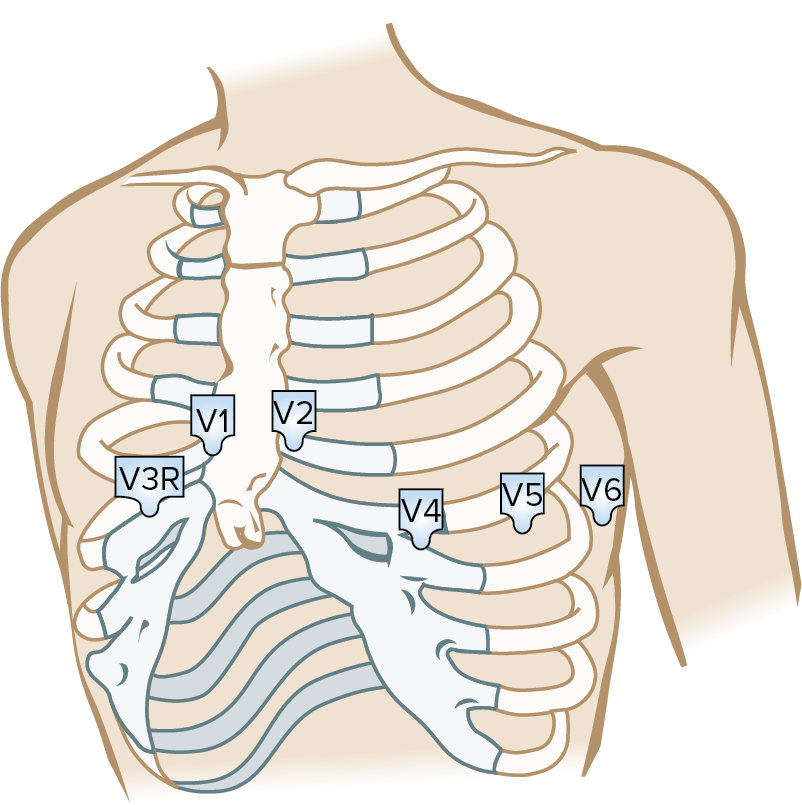
When will a patient require cardiac monitoring?
At the scene of an emergency, during a hospital stay, before/after surgery, or if there are cardiac, pulmonary, or electrolyte problems.
During continuous cardiac monitoring what kind of leads are used
Lead II or modified chest lead bc they provide the best view of atrial activity (p-wave)
What is a rhythm strip used for?
TO check the heart rhythm for abnormalities and is usually ran on Lead II.
T/F: When changes in the placement of leads are needed, there is nothing else you need to do.
F: it is critical that you indicate any modifications in electrode placement, so document or record this change.
Modified placement for women considerations
Women with implants or large breasts
Careful placement for women who had a mastectomy
Pregnant women can have the lower limb leads placed on thighs
Amputee patients
Place limb leads on the upper chest or lower abdomen
Patients with wounds and burns
May have to place in an alternative location
Geriatric patients
Carefully remove electrodes from skin because they have very thin skin
Alternative lying positions
Indicate on tracing alternative position
May need to adjust position to Fowler’s or semi Fowler’s which require head of the bed to be elevated
Patients in the fetal position may need electrodes placed where?
on their back
Patients with dextrocardia (heart on left)
Mirror image of a left sided 12 lead ECG
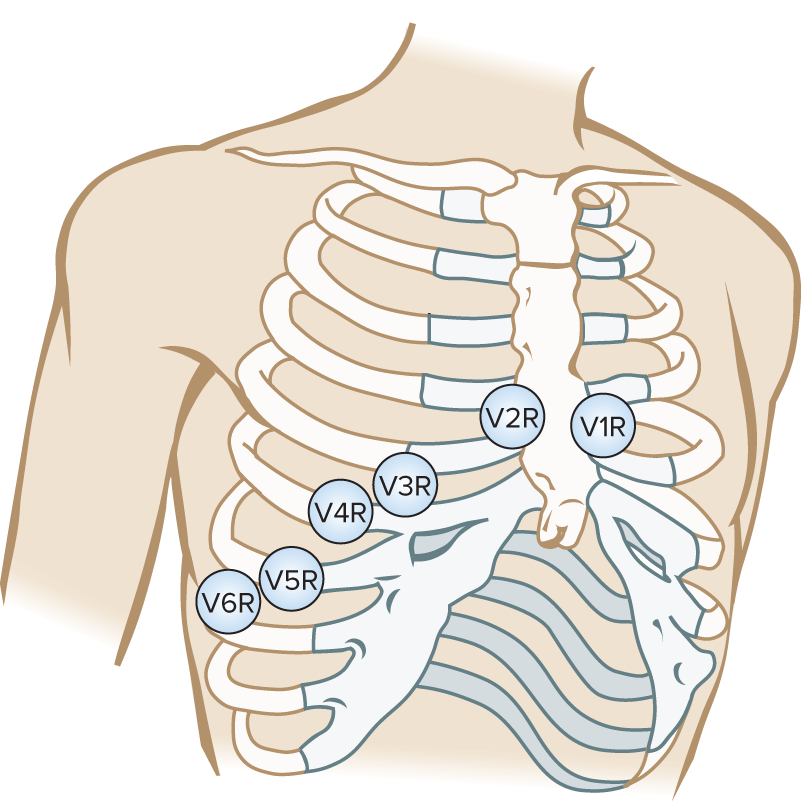
Additional leads (V7-V9; V7R-V9R)
Known as a posterior 12-lead ECG focuses on the posterior aspect of the heart.
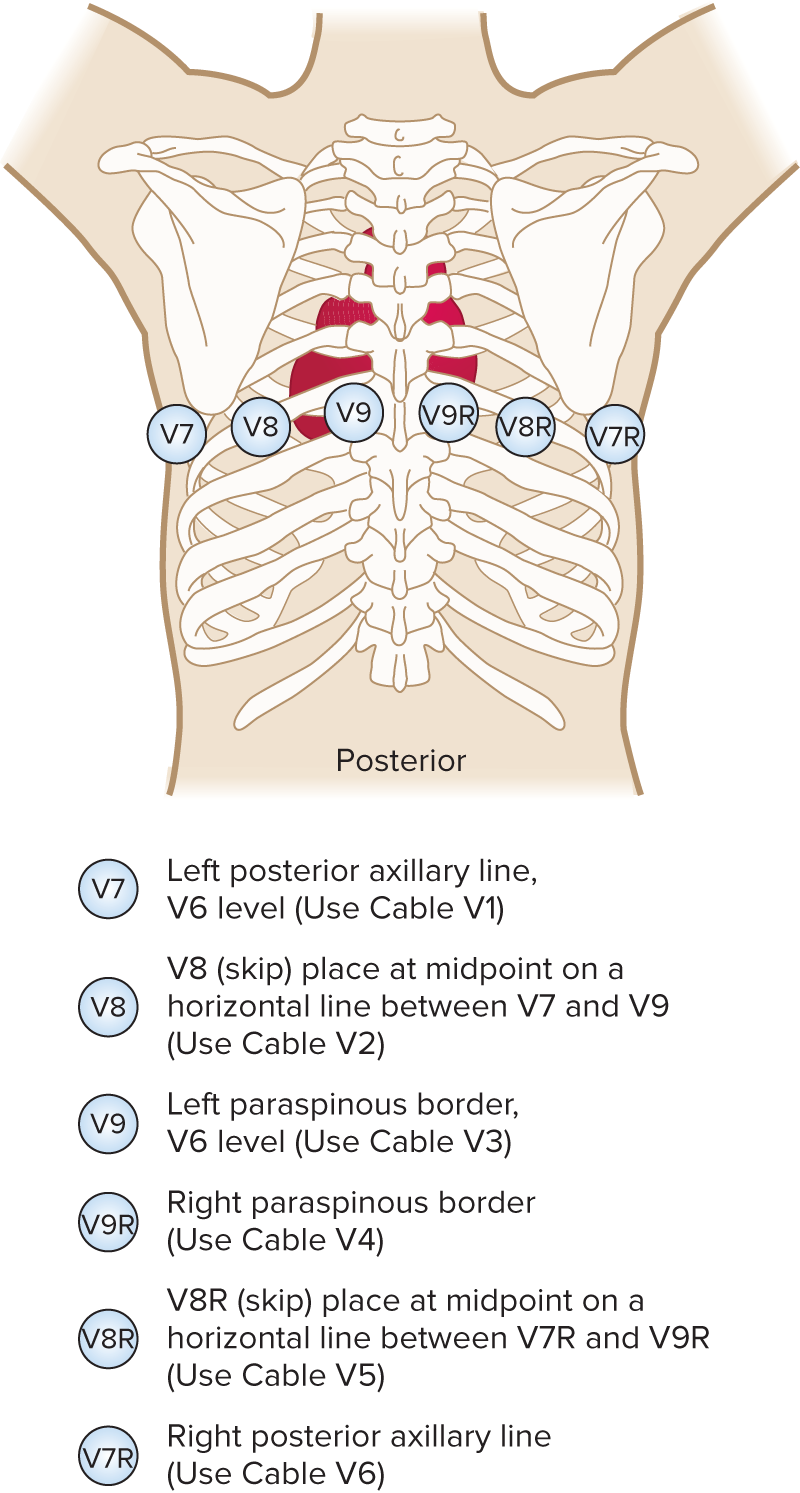
During a code blue, be read to
perform the tracing as quickly and efficiently as possible. You may need to perform multiple ECGs in a row.
What to do when a patient has a seizure?
Stay with patient and call for help
Remove any objects that may cause injury
Do not try to hold patient
Loose restrictive clothing
Keep patient on their side
Do ECG once seizure is over